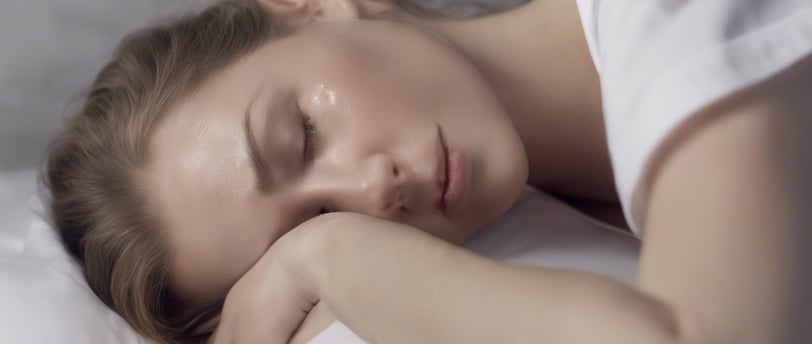The Connection Between Sleep and Skin Health
Quality sleep is often overlooked as a cornerstone of overall health, yet its impact on our physical well-being is profound. One of the most visible areas where inadequate sleep manifests is the skin. As the body’s largest organ, the skin not only reflects internal health but also serves as a barrier against external aggressors. In this article, we delve into the intricate relationship between sleep and skin health, highlighting the science behind this connection and how you can optimize both for radiant skin and overall vitality.
Ifsha Akhlaq
11/29/20243 min read


The Role of Sleep in Skin Regeneration
During sleep, the body undergoes repair processes that are vital for maintaining healthy skin. The deepest stages of sleep, particularly non-REM (NREM) stages, are when cellular repair and regeneration occur. During these stages:
Collagen production increases, aiding in skin elasticity and reducing fine lines and wrinkles.
Blood flow to the skin intensifies, providing essential nutrients and oxygen for a healthy complexion.
The skin’s barrier function strengthens, offering enhanced protection against environmental pollutants and harmful UV rays.
Without sufficient restorative sleep, these critical processes are disrupted, leaving the skin dull, dehydrated, and prone to premature aging.
How Sleep Deprivation Affects the Skin
Chronic lack of sleep exerts a cascading effect on skin health. Among the most notable consequences are:
1. Accelerated Aging
Sleep deprivation boosts cortisol levels, a stress hormone that breaks down collagen and elastin. These proteins are fundamental for skin firmness and elasticity. Over time, this leads to sagging skin, deeper wrinkles, and a tired appearance.
2. Impaired Skin Barrier Function
A compromised barrier function makes the skin more susceptible to irritants and allergens. Research indicates that sleep deprivation weakens the epidermal layer, leading to increased trans-epidermal water loss (TEWL) and dehydration.
3. Worsening Skin Conditions
Chronic sleep loss can exacerbate conditions such as acne, eczema, and psoriasis. This occurs due to inflammation triggered by elevated stress hormones and a weakened immune response.
4. Dark Circles and Puffiness
Poor sleep impairs lymphatic drainage, leading to fluid accumulation around the eyes. This results in the hallmark signs of fatigue: dark circles and under-eye bags.
The Science of Beauty Sleep
The term "beauty sleep" is not a myth. Scientific studies corroborate that individuals who achieve adequate sleep appear more youthful and attractive. This is due to the reparative processes that occur during uninterrupted sleep cycles, which are vital for:
Even skin tone: Reduced inflammation helps minimize redness and blotchiness.
Smooth texture: Cellular turnover promotes fresher, smoother skin.
Hydration: Proper sleep supports moisture retention, giving the skin a plump, healthy glow.
Optimizing Sleep for Better Skin Health
1. Prioritize Consistency
Maintain a regular sleep schedule, aiming for 7-9 hours of quality sleep each night. Irregular sleep patterns disrupt the body’s circadian rhythm, impeding skin repair.
2. Create a Skin-Friendly Sleep Environment
Use a silk or satin pillowcase to minimize friction and prevent creases.
Sleep on your back to avoid compressing facial skin, which can lead to wrinkles.
Ensure your bedroom is dark, cool, and quiet, promoting deeper sleep stages.
3. Support Skin Repair with Nutrition
Consume a diet rich in:
Vitamin C: Essential for collagen synthesis and protection against oxidative stress.
Omega-3 fatty acids: Promote skin hydration and reduce inflammation.
Zinc: Supports wound healing and reduces acne severity.
4. Establish a Nighttime Skincare Routine
Prepare your skin for its nightly repair by:
Removing all makeup and impurities to prevent clogged pores.
Applying a moisturizer with hyaluronic acid or ceramides to lock in hydration.
Using treatments like retinol or peptides to support collagen production and cellular turnover.
Sleep Disorders and Their Impact on Skin
Conditions such as insomnia, sleep apnea, and restless leg syndrome can profoundly affect skin health. Sleep apnea, in particular, is linked to chronic hypoxia, reducing oxygen supply to skin cells and accelerating aging. Seeking professional help to address these issues can restore not only sleep quality but also skin vitality.
The Psychological Benefits of Rested Skin
Well-rested skin enhances confidence and self-esteem. Individuals who achieve adequate sleep often report a positive body image and reduced stress levels, which further benefit overall health.
Conclusion
Sleep is an indispensable pillar of skin health, providing the foundation for a radiant complexion and delaying the signs of aging. By prioritizing consistent, high-quality sleep and pairing it with effective skincare and lifestyle practices, we can harness the full potential of beauty sleep. Embracing this holistic approach not only revitalizes the skin but also enhances overall well-being, allowing us to look and feel our best each day.
